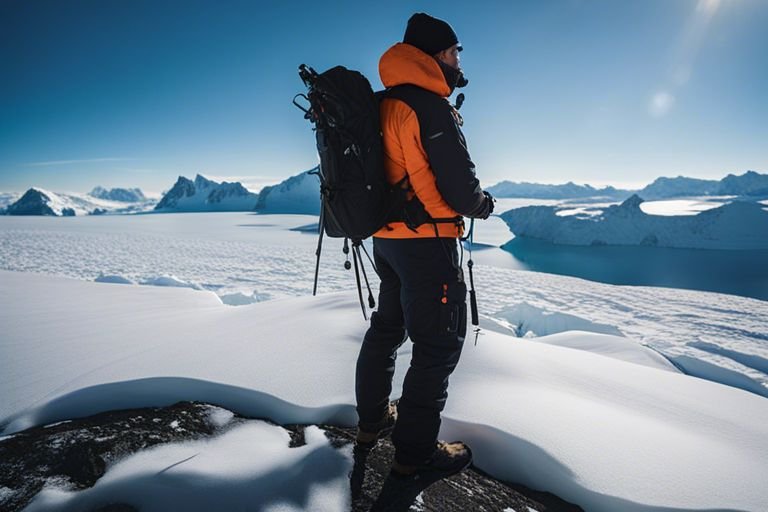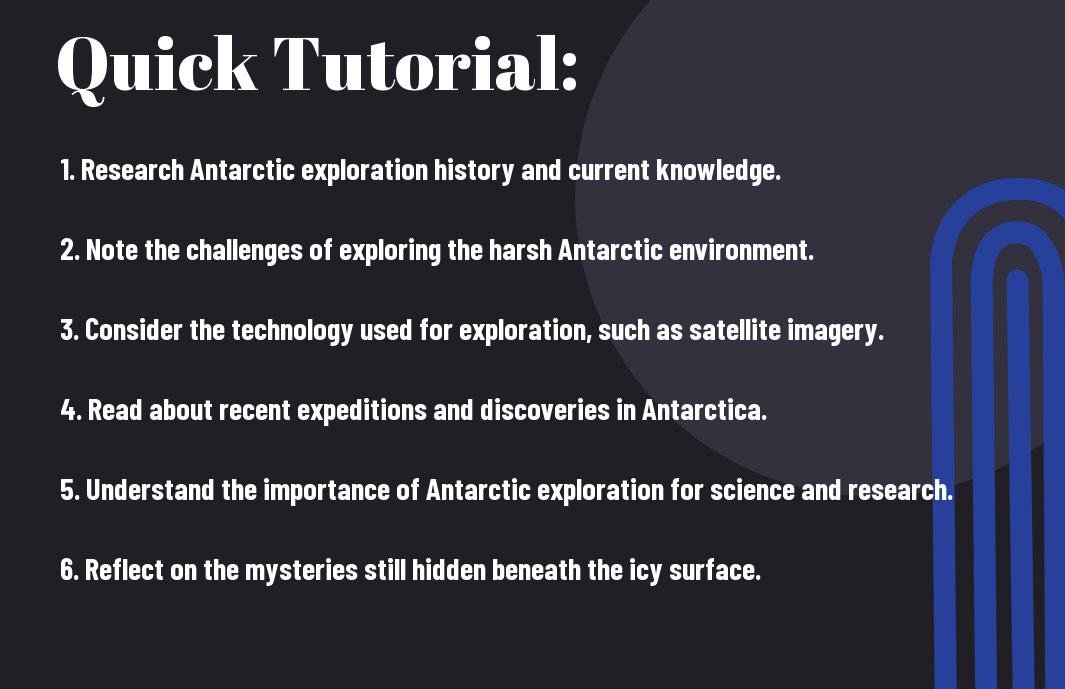How Much of Antarctica Has Been Explored? The Mystery of the Frozen Continent
- Home
- How Much of Antarctica Has Been Explored? The Mystery of the Frozen Continent

How Much of Antarctica Has Been Explored? The Mystery of the Frozen Continent
Lacking an exact figure, I have aimed to unravel the enigma of Antarctica’s exploration. This desolate land remains one of the least explored regions on Earth, with only 2% of its vast expanse having been thoroughly studied and documented. The extreme climate and treacherous terrain pose significant challenges to any expedition, making it a dangerous and daunting quest for researchers and adventurers alike. However, the remarkable discoveries and scientific breakthroughs that have emerged from these expeditions are a testament to the resilience and determination of mankind. Join me as we delve into the mysteries of this frozen continent and uncover the secrets that lie beneath its icy surface.
Key Takeaways:
- Only a fraction of Antarctica has been explored, with vast swathes of the continent remaining untouched and unexplored.
- Exploration efforts have largely focused on the coastal regions, leaving the interior of Antarctica largely uncharted and shrouded in mystery.
- New technologies such as satellite imagery and LiDAR are helping to uncover the secrets of Antarctica, revealing previously unseen features and landscapes.
- Scientific research conducted in Antarctica has revealed valuable information about climate change, ice dynamics, and ecosystems, contributing to our understanding of the planet’s future.
- The icy continent continues to captivate the imagination of explorers and scientists, with ongoing efforts to unlock the remaining mysteries of this frozen land.
The Importance of Exploring Antarctica
Before I delve into the mystery of the unexplored areas of Antarctica, it’s essential to understand the significance of exploring this frozen continent. Antarctica is not just a desolate landmass covered in ice and snow; it holds immense importance for scientific research, environmental impact studies, and exploration of Earth’s last untouched frontier.
Scientific Discoveries
Exploring Antarctica has led to groundbreaking scientific discoveries that have greatly contributed to our understanding of the planet. From studying the unique and diverse ecosystems that thrive in the harsh conditions of Antarctica to unlocking the secrets of the Earth’s climate history, scientific expeditions in Antarctica have provided invaluable data that has global implications. Research on the continent has also led to significant advances in fields such as glaciology, geology, oceanography, and biology, furthering our knowledge and understanding of the natural world.
Environmental Impacts
Exploring Antarctica allows us to gain crucial insights into the state of our planet and the impact of human activities on the environment. The continent’s remote and pristine environment serves as a critical barometer for measuring global environmental changes. By studying Antarctica, scientists can assess the effects of climate change, pollution, and other human-induced impacts on the ecosystem. Understanding these environmental impacts is crucial for developing effective conservation and sustainability measures to protect our planet for future generations.
Challenges of Antarctic Exploration
Even though Antarctica is a continent of great scientific interest, the exploration of this frozen region presents many challenges. From its harsh climate to the difficulties of isolation and logistics, navigating the mysteries of this remote land has proven to be a daunting task.
Harsh Climate
The harsh climate of Antarctica is one of the most significant challenges for exploration. With temperatures plunging to record lows of -129°F (-89°C), Antarctica is not only the coldest place on earth but also the driest. The extreme cold and wind chills make it difficult for explorers to spend extended periods of time outside, posing a significant risk to their health and safety. Even with modern technology and advanced protective gear, the unforgiving climate remains a formidable obstacle for anyone attempting to uncover the secrets of this frozen continent.
Isolation and Logistics
Isolation and logistics present another set of challenges for those seeking to explore Antarctica. The continent’s remote location, coupled with its harsh climate, makes it incredibly difficult to access and navigate. The absence of infrastructure and the limited availability of supplies and resources further complicates expeditions to this icy landscape. Additionally, the sheer distance from established medical facilities raises concerns about emergency response and evacuation in the event of an unforeseen accident or health issue. The logistical challenges involved in planning and executing a successful Antarctic expedition require meticulous preparation and an unwavering commitment to overcoming the hurdles presented by the remote and isolated nature of this continent.
Exploration Efforts
Now, let’s dig into the exploration efforts that have been made to uncover the mysteries of Antarctica. Over the years, there have been numerous historical missions and modern expeditions that have aimed to understand the frozen continent and its unique ecosystem.
Historical Missions
Historical missions to Antarctica have been marked by incredible feats of bravery and exploration. Some of the earliest expeditions, including those led by Roald Amundsen and Ernest Shackleton, involved treacherous journeys through harsh, uncharted territory. These explorers faced extreme cold, limited resources, and the constant threat of isolation and danger. Their efforts laid the groundwork for future exploration and inspired generations of adventurers to follow in their footsteps.
Modern Expeditions
In more recent times, modern expeditions to Antarctica have utilized advanced technology and scientific research to delve deeper into the continent’s mysteries. These missions have uncovered vital information about the effects of climate change on the region, as well as the unique biodiversity that exists in this extreme environment. Despite the challenges of navigating the icy terrain and harsh weather conditions, modern explorers have made significant strides in expanding our understanding of Antarctica.
Future of Antarctic Exploration
Your interest in the future of Antarctic exploration is well-founded. As technology continues to advance, the possibilities for further exploration of the frozen continent are expanding rapidly. From improved satellite imaging to cutting-edge robotics, the future of Antarctic exploration holds great promise for uncovering more of the mysteries hidden beneath the ice.
Technology Advancements
With the rapid pace of technological advancement, the tools available for Antarctic exploration are undergoing a transformation. From state-of-the-art drones and underwater vehicles to sophisticated ice-penetrating radar, these technological advancements are enabling scientists and researchers to delve deeper into the heart of Antarctica than ever before. The use of advanced satellite imaging is providing unprecedented detail of the continent’s surface, allowing for the identification of potential areas of interest for further exploration.
Potential Discoveries
The potential for groundbreaking discoveries in Antarctica cannot be underestimated. As more of the continent is explored, the possibility of uncovering new species, ancient fossils, and even unknown geological formations becomes increasingly likely. Additionally, the study of Antarctica’s ice cores holds the potential to provide critical insights into past climate conditions and the future effects of climate change. The exploration of Antarctica also offers the chance to expand our understanding of the continent’s unique ecosystem and its role in the global climate system.

How Much of Antarctica Has Been Explored? The Mystery of the Frozen Continent
So in conclusion, although significant progress has been made in exploring Antarctica, there is still much of the continent that remains a mystery. With only a small percentage of the landmass thoroughly surveyed and mapped, there is still so much to learn about this frozen, remote region. As technologies improve and interest in Antarctica grows, I am hopeful that we will continue to uncover the secrets of this enigmatic continent, shedding light on its important role in Earth’s climate system and ecosystem. It is up to our generation and the ones to come to carry on the legacy of exploration and stewardship of this unique and valuable part of our planet.
FAQ
Q: How much of Antarctica has been explored?
A: Approximately 2% of Antarctica has been explored and studied, while the remaining 98% is still a mystery waiting to be discovered.
Q: What are the challenges of exploring Antarctica?
A: The challenges of exploring Antarctica include extreme cold temperatures, harsh weather conditions, isolation, and limited resources for sustenance and survival.
Q: Why is it important to explore Antarctica?
A: Exploring Antarctica is important for furthering our understanding of climate change, biodiversity, and geology. It also provides valuable insights into the Earth’s history and potential future scenarios.
Q: What discoveries have been made in Antarctica so far?
A: Some significant discoveries in Antarctica include the existence of large subglacial lakes, unique species of wildlife adapted to the extreme environment, and evidence of ancient civilizations and meteorite impacts.
Q: Who leads the exploration efforts in Antarctica?
A: Exploration efforts in Antarctica are led by various national research programs and scientific institutions, including the United States Antarctic Program, British Antarctic Survey, and Antarctic research programs from other nations. These organizations work collaboratively to conduct research and map the continent’s unexplored regions.
- Share
Mark Twain
Mark Twain stands at the helm of Create More Flow, infusing every sentence with the wisdom of his 15-year expeience through the seas of SEO and content creation. A former BBC Writer, Mark has a knack for weaving simplicity and clarity into a tapestry of engaging narratives. In the realm of content, he is both a guardian and a guide, helping words find their flow and stories find their homes in the hearts of readers. Mark's approach is grounded in the belief that the best content feels like a chat with an old friend: warm, inviting, and always memorable. Let Mark's expertise light up your website with content that's as friendly to Google as it is to your audience. Each word is chosen with care, each sentence crafted with skill - all to give your message the human touch that both readers and search engines love.
